| Srl | Item |
| 1 |
ID:
070892
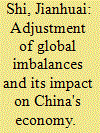

|
|
|
| 2 |
ID:
123341


|
|
|
|
|
| Publication |
2013.
|
| Summary/Abstract |
Based on simulations of an original DGE model of the US and the Chinese economies under various monetary regimes, we show that an overhaul of China's social safety net is capable of reducing global imbalances whatever the exchange-rate regime, provided international capital flows are allowed to react to expected return differentials, which requires some relaxation of capital controls. Exchange-rate flexibility would accelerate the rebalancing, but not make it larger. A monetary reform would fail to rebalance the economy unless the government simultaneously acts to curb NFA accumulation through consumption-enhancing reform or reducing its objective in terms of reserve accumulation.
|
|
|
|
|
|
|
|
|
|
|
|
|
|
|
|
| 3 |
ID:
088469
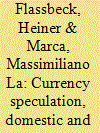

|
|
|
|
|
| Publication |
2009.
|
| Summary/Abstract |
China has undergone a deep, although gradual, process of reform of its financial system and exchange rate regime while avoiding large speculative inflows and uncontrolled real appreciation through non-monetary anti-inflationary policies, low interest rates and capital account controls. These policies remain of crucial importance while the country is strengthening its domestic financial system and its exchange rate market, but they should be supported by internationally coordinated policies and cooperative monetary schemes to reduce global imbalances and destabilizing cross-currency speculation.
|
|
|
|
|
|
|
|
|
|
|
|
|
|
|
|
| 4 |
ID:
138043
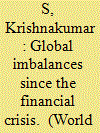

|
|
|
|
|
| Summary/Abstract |
This paper undertakes an appraisal of the origins of global imbalances since the late 1990s, examines the link to the global financial crisis and the consequences of the untavelling of the existing financial system on emergin market economies.
|
|
|
|
|
|
|
|
|
|
|
|
|
|
|
|
| 5 |
ID:
097830
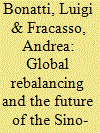

|
|
|
|
|
| Publication |
2010.
|
| Summary/Abstract |
The crisis of 2008 has shown the unsustainability of the global imbalances centered on the US-China symbiotic relationship that characterized the previous decade. This has revived the so-called growth-rebalancing debate. In particular, the new emerging consensus calls for a re-orientation of the US economy away from consumption and toward exports, and for policy shifts that can help China to reduce its dependence on external demand and inefficiently high rates of capital accumulation. We discuss the economic and political feasibility of the proposed patterns of re-adjustment by focusing on the short-term and long-term trade-offs faced by the policy-makers. We argue that the rebalancing will be gradual and partial because of the costs associated with a radical shift in the growth models adopted by both countries. We believe that this scenario will be consistent with a world economy expanding at lower rates than over the past decade.
|
|
|
|
|
|
|
|
|
|
|
|
|
|
|
|
| 6 |
ID:
084742
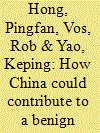

|
|
|
|
|
| Publication |
2008.
|
| Summary/Abstract |
Our study shows that China could contribute to an orderly global rebalancing using a package of policies to stimulate its domestic consumption. These policies include a progressive appreciation of the RMB, fiscal stimulation by increasing expenditure on education, health care, social safety nets and poverty reduction, income policies to reduce inequality and to strengthen wage income, and reforms of the financial system to improve financial efficiency and to mitigate financial constraints. By implementing such policies, China's external surplus could be narrowed and its domestic imbalances improved. The excessively high savings rate could be lowered and the share of household consumption increased, even though GDP growth would moderate slightly.
|
|
|
|
|
|
|
|
|
|
|
|
|
|
|
|
| 7 |
ID:
146695
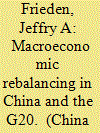

|
|
|
|
|
| Summary/Abstract |
The principal challenge facing the world economy is the risk of recurrent financial crises. Global macroeconomic imbalances create the conditions for boom-and-bust cycles that are extremely costly for the countries that experience them, and that can affect other nations and the entire world economy as well. The G20 recognizes the importance of these trends, and has committed itself to cooperative measures to reduce imbalances. However, progress has been limited and halting. There are major political obstacles to global macroeconomic policy cooperation, both within countries and among countries. China's attempts to rebalance its economy are crucial to broader international financial stability. Its G20 presidency gives China the opportunity to demonstrate that it is willing and able to advance its cooperation with economic partners, and to help lead the rest of the world in this direction.
|
|
|
|
|
|
|
|
|
|
|
|
|
|
|
|
| 8 |
ID:
096249
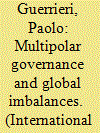

|
|
|
|
|
| Publication |
2010.
|
| Summary/Abstract |
The deficiency of financial regulation and the presence of large macroeconomic global imbalances should be considered complementary interpretations of the global economic and financial crisis. The risk we face is that a new expansionary phase will bring back large and growing external imbalances, which will keep world growth on an unsustainable path. At the international level there is a classical 'collective action' problem to address since if export growth oriented strategies are pursued by all major countries they will generate a deflationary bias in world demand. This article explores how multilateral cooperation and international institutions can become reengaged with, and provides a meaningful device for addressing, these new issues and problems. It is necessary to restore shared rules of the game for international macroeconomic adjustment. This means endorsing a strengthened surveillance regime for the IMF in order to induce more compatible macroeconomic policies. In this regard, the IMF should have enforcement rule incentives and mechanisms, otherwise we are going to repeat past negative experiences where peer pressure did not produce significant results.
|
|
|
|
|
|
|
|
|
|
|
|
|
|
|
|
| 9 |
ID:
070890
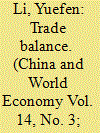

|
|
|
| 10 |
ID:
162428
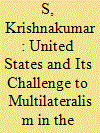

|
|
|
|
|
| Summary/Abstract |
With Donald Trump as President of United States, multilateralism in the world economy is facing an unprecedented challenge. The international economic institutions that have evolved since the fifties are increasingly under the risk of being undermined. With the growing assertion of the emerging and developing economies in the international fora, United States is increasingly sceptical of its ability to maneuvre such institutions to suit its own purpose. This is particularly true with respect to WTO, based on “one country one vote” system. The tariff rate hikes initiated by the leader country in the recent past pose a serious challenge to the multilateral trading system. The paper tries to undertake a critical overview of the US pre-occupation of targeting economies on the basis of the bilateral merchandise trade surpluses of countries, through the trade legislations like Omnibus Act and Trade Facilitation Act. These legislations not only ignore the growing share of the United States in the growing invisibles trade in the world economy, but also read too much into the bilateral trade surpluses of economies with United States and the intervention done by them in the foreign exchange market.
|
|
|
|
|
|
|
|
|
|
|
|
|
|
|
|